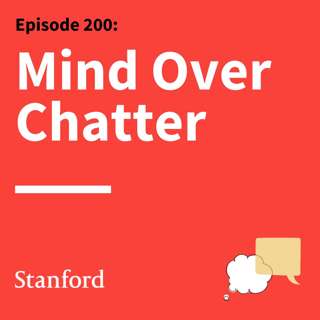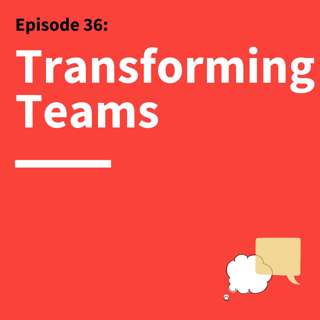
36. Perfecting Teamwork: Building High-Performing Teams By Encouraging Learning
In this episode of Think Fast, Talk Smart, Sara Singer, a professor of organizational behavior (by courtesy) at Stanford Graduate School of Business and a professor of medicine at Stanford School of Medicine, sits down with lecturer Matt Abrahams to discuss the role of open communication in high-performing teams. “Learning requires leadership that reinforces learning, a supportive environment, including especially psychological safety, but also an appreciation for differences when you’re working with people of lots of different backgrounds, and openness to new ideas,” she says.Connect:Premium Signup >>>> Think Fast Talk Smart PremiumEmail Questions & Feedback >>> hello@fastersmarter.ioEpisode Transcripts >>> Think Fast Talk Smart WebsiteNewsletter Signup + English Language Learning >>> FasterSmarter.ioThink Fast Talk Smart >>> LinkedIn, Instagram, YouTubeMatt Abrahams >>> LinkedIn ********This episode is sponsored by Grammarly. Let Grammarly take the busywork off your plate so you can focus on high-impact work. Download Grammarly for free today Join our Think Fast Talk Smart Learning Community and become the communicator you want to be.
15 Juli 202124min
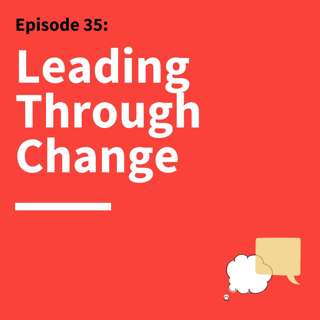
35. Leading From The Hot Seat: How To Communicate Under Pressure
“I say sometimes that leadership is a journey into yourself. It’s self-renewal, self-reflection, self-confidence. It’s going to bed kind of scratching your head and saying, “Man, I’m not as good,” and waking up the next morning and trying it again — and I think that’s what matters.” In this episode of Think Fast, Talk Smart, former CEO of General Electric and Stanford Graduate School of Business lecturer Jeff Immelt sits down with lecturer Matt Abrahams to discuss communicating during times of challenge and pressure. “There’s no such thing as perfection of crisis,” Immelt says. “This is a pass-fail test, and all you really want to do is make progress.”Connect:Premium Signup >>>> Think Fast Talk Smart PremiumEmail Questions & Feedback >>> hello@fastersmarter.ioEpisode Transcripts >>> Think Fast Talk Smart WebsiteNewsletter Signup + English Language Learning >>> FasterSmarter.ioThink Fast Talk Smart >>> LinkedIn, Instagram, YouTubeMatt Abrahams >>> LinkedIn ********This episode is sponsored by Grammarly. Let Grammarly take the busywork off your plate so you can focus on high-impact work. Download Grammarly for free today Join our Think Fast Talk Smart Learning Community and become the communicator you want to be.
25 Juni 202125min
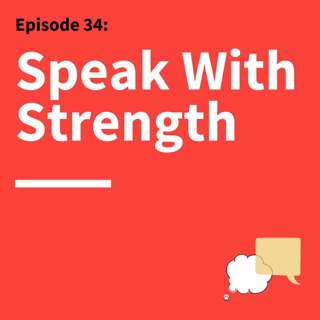
34. How We Gain — Or Give Away — Authority While Speaking
“Simple language, forceful language, vivid language, and keeping it simple and direct,” says Professor Jeffrey Pfeffer, are all tools to increase the strength of your communication. In this episode of Think Fast, Talk Smart, host and lecturer Matt Abrahams interviews Jeffrey Pfeffer, author of Dying for a Paycheck, about the verbal and nonverbal ways we can harness, or give away, our authority in communication. To hear more from Jeffrey, listen to Pfeffer on Power, a podcast about accelerating your career.Connect:Premium Signup >>>> Think Fast Talk Smart PremiumEmail Questions & Feedback >>> hello@fastersmarter.ioEpisode Transcripts >>> Think Fast Talk Smart WebsiteNewsletter Signup + English Language Learning >>> FasterSmarter.ioThink Fast Talk Smart >>> LinkedIn, Instagram, YouTubeMatt Abrahams >>> LinkedIn ********This episode is sponsored by Grammarly. Let Grammarly take the busywork off your plate so you can focus on high-impact work. Download Grammarly for free today Join our Think Fast Talk Smart Learning Community and become the communicator you want to be.
3 Juni 202123min
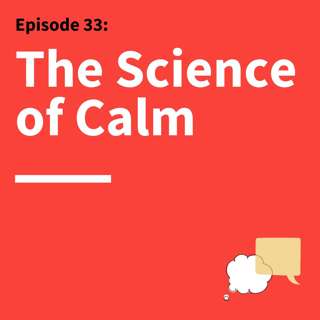
33. Hacking your Speaking Anxiety: How Lessons from Neuroscience Can Help You Communicate Confidently.
“There’s no difference between the physiological response to something that you’re excited about and something that you’re nervous about or dreading,” says Andrew Huberman, associate professor of neurobiology and ophthalmology at Stanford University. In this podcast episode, Huberman talks with host and lecturer Matt Abrahams about his research on the autonomic continuum, a spectrum between states of very high alertness or fear, all the way down to deep sleep, and shares how to better-use the system to your advantage. “If people can conceptualize that the anxiety or stress response is the same as the excitement response, they feel different,” Huberman says. Connect:Premium Signup >>>> Think Fast Talk Smart PremiumEmail Questions & Feedback >>> hello@fastersmarter.ioEpisode Transcripts >>> Think Fast Talk Smart WebsiteNewsletter Signup + English Language Learning >>> FasterSmarter.ioThink Fast Talk Smart >>> LinkedIn, Instagram, YouTubeMatt Abrahams >>> LinkedIn ********This episode is sponsored by Grammarly. Let Grammarly take the busywork off your plate so you can focus on high-impact work. Download Grammarly for free today Join our Think Fast Talk Smart Learning Community and become the communicator you want to be.
13 Maj 202131min
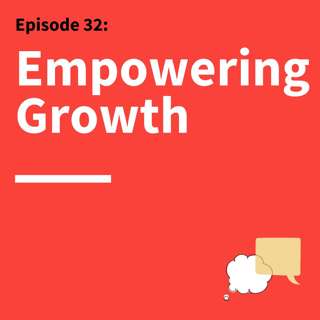
32. Speech That Empowers: How to Encourage Growth and Resilience in a Younger Audience
“Communication is such a delicate dance and kids need to emerge from childhood having practiced,” says Julie Lythcott-Haims, former associate vice provost of undergraduate education Stanford University. In this episode of Think Fast, Talk Smart, lecturer and podcast host Matt Abrahams sits down with Lythcott-Haims to discuss her new book, Your Turn: How to be an Adult, and ideas on how to communicate with young people so they feel empowered to take on the various (and often intimidating) duties of adulthood. “Responsibility isn’t a bad thing,” she says. “Responsibility is actually an amazing thing. And I think we have to do a better job of narrating that truth.”Connect:Premium Signup >>>> Think Fast Talk Smart PremiumEmail Questions & Feedback >>> hello@fastersmarter.ioEpisode Transcripts >>> Think Fast Talk Smart WebsiteNewsletter Signup + English Language Learning >>> FasterSmarter.ioThink Fast Talk Smart >>> LinkedIn, Instagram, YouTubeMatt Abrahams >>> LinkedIn ********This episode is sponsored by Grammarly. Let Grammarly take the busywork off your plate so you can focus on high-impact work. Download Grammarly for free today Join our Think Fast Talk Smart Learning Community and become the communicator you want to be.
22 Apr 202127min

31. Quick Thinks: How to Shine Online and Excel at Virtual Communication
It has been over a year since millions of people have switched from office work to working from home. In this episode of Think Fast, Talk Smart, lecturer and host Matt Abrahams highlights guests’ top takeaways on how to best communicate, share information, and cultivate a professional presence though the screen. “I think we have to find ways to reduce cognitive overload,” says Professor and Senior Associate Dean Sarah Soule. “I now offer my information in much smaller pieces interspersed with breakout groups.”Connect:Premium Signup >>>> Think Fast Talk Smart PremiumEmail Questions & Feedback >>> hello@fastersmarter.ioEpisode Transcripts >>> Think Fast Talk Smart WebsiteNewsletter Signup + English Language Learning >>> FasterSmarter.ioThink Fast Talk Smart >>> LinkedIn, Instagram, YouTubeMatt Abrahams >>> LinkedIn ********This episode is sponsored by Grammarly. Let Grammarly take the busywork off your plate so you can focus on high-impact work. Download Grammarly for free today Join our Think Fast Talk Smart Learning Community and become the communicator you want to be.
16 Apr 202111min
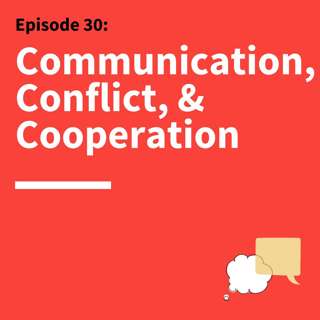
30. Dissolve Disagreements: How Communication Impacts Conflict
“Communication, conflict, and cooperation are intertwined in a multitude of ways,” says Nir Halevy, associate professor of organizational behavior at Stanford Graduate School of Business. In this episode of Think Fast, Talk Smart, Halevy sits down with host and lecturer Matt Abrahams, to discuss how we can often solve conflicts and disagreements by employing the correct strategy in our communication. “How you articulate a particular grievance, your choice of words, the nonverbal aspects of your claim, such as the tone of your voice, can definitely influence reactions to your claim,” Halevy says. Connect:Premium Signup >>>> Think Fast Talk Smart PremiumEmail Questions & Feedback >>> hello@fastersmarter.ioEpisode Transcripts >>> Think Fast Talk Smart WebsiteNewsletter Signup + English Language Learning >>> FasterSmarter.ioThink Fast Talk Smart >>> LinkedIn, Instagram, YouTubeMatt Abrahams >>> LinkedIn ********This episode is sponsored by Grammarly. Let Grammarly take the busywork off your plate so you can focus on high-impact work. Download Grammarly for free today Join our Think Fast Talk Smart Learning Community and become the communicator you want to be.
31 Mars 202124min
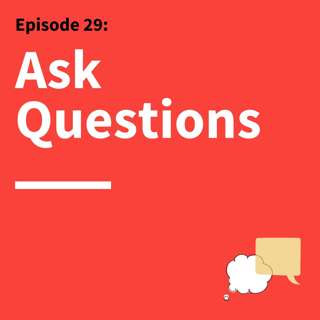
29. Question Everything: Why Curiosity Is Communication’s Secret Weapon
The information you receive is only as strong as the questions you ask. In this episode of Think Fast, Talk Smart, Stanford Graduate School of Business lecturers Matt Abrahams and Debra Schifrin discuss how to craft inquiries that can lead to better communication outcomes. Questions are also instrumental in building relationships, Schifrin points out. “If you’re asking questions, you’re signaling to the other person that you value them. You’re taking time to listen to their answers.”Connect:Premium Signup >>>> Think Fast Talk Smart PremiumEmail Questions & Feedback >>> hello@fastersmarter.ioEpisode Transcripts >>> Think Fast Talk Smart WebsiteNewsletter Signup + English Language Learning >>> FasterSmarter.ioThink Fast Talk Smart >>> LinkedIn, Instagram, YouTubeMatt Abrahams >>> LinkedIn ********This episode is sponsored by Grammarly. Let Grammarly take the busywork off your plate so you can focus on high-impact work. Download Grammarly for free today Join our Think Fast Talk Smart Learning Community and become the communicator you want to be.
11 Mars 202127min
